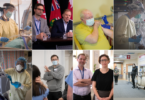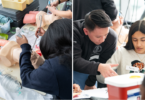Sunnybrook is closely following the spread of COVID-19, the novel coronavirus that has emerged from Wuhan, China.
Dr. Samira Mubareka, infectious diseases physician and microbiologist, and Dr. Jerome Leis, infectious diseases physician and medical director of infection prevention and control, answer some questions about this novel coronavirus below.
What is a coronavirus?
Dr. Samira Mubareka (S.M.): The term corona actually describes what the virus looks like under an electron microscope. There are proteins on the surface that people think look like a crown [corona is Latin for crown].
The group of viruses is actually quite diverse. These viruses can infect birds, animals and, of course, humans.
A number of coronaviruses that infect humans every year, and there are four in particular that cause the common cold. So, most of us would have been infected with one of these coronaviruses, if not all of them, at some point in our lives. These are coronaviruses that are fairly well-characterized. Obviously, there’s a spectrum of illness associated with them, like the common cold – most cases are mild, but for some patients, even a common cold can lead to a more severe illness.
In addition to those four common strains, up until now there were two strains associated more with severe illness: SARS and MERS.
I’ve heard people compare this novel coronavirus to SARS. Is it really that similar?
Dr. Jerome Leis (J.L.): While you may have seen some comparisons being made to the SARS virus that we saw in 2003, there are a few important differences.
- The improvements in diagnostics have allowed scientists to rapidly identify the cause of this infection as a coronavirus – with improved communication and surveillance compared to what happened in 2003. This can really help limit spread of the infection.
- Although we are still learning about this virus, the infection that it causes does not appear to be as severe.
- Our public health and infection control programs in Canada have improved significantly compared to 2003, which allows us to rapidly respond and limit spread of this infection.
How has the response to this outbreak been so far?
S.M.: From the outset of this outbreak, there’s been a lot more transparency and communication. That’s very different from SARS back in 2003, where information was guarded, was not being shared openly, or there were conflicting pieces of information coming out. What we’re seeing right now [from authorities in China] is more consistent reporting, more transparency and much clearer communication.
The other thing is that we know what we’re dealing with this time. With SARS, it was a very long time before they identified the causative agent as a coronavirus. At one point they even thought it was bacteria that was responsible.
This time – partly because of history and learning from that, and also because we have better tools now than we did 15 years ago – they were able to identify the causative agent as a coronavirus and then sequence it really early on. Not only does that help reassure people as to what’s going on, but it also helps scientists, microbiologists and virologists to develop diagnostic tests. It’s a lot easier to develop an assay if you know what the sequence is.
Since SARS, our public health and infection control programs have been strengthened. That has a huge impact, probably more than anything, in terms of actually controlling the spread of these viruses.
What are the symptoms of this novel coronavirus?
S.M.: So far, it does sound like a lot of the cases can be mild. There are definitely more severe cases like pneumonia, or they can lead to respiratory failure, and there have been a few deaths. But the symptoms are really non-specific, so they’re a lot like what we would see with the influenza virus, things like fever, dry cough, sore throat, muscle aches, headaches, those kinds of things. Unfortunately, there’s no specific symptom associated with this particular virus.
Is Sunnybrook doing any additional screening for this novel coronavirus?
S.M.: Since it happens to be flu season right now, as part of our protocols, people are being screened at the majority of healthcare centres for these symptoms. We’ll be using protocols that we’re already using on an annual basis for the influenza virus.
J.L.: It’s helpful that it’s flu season, because healthcare workers already know to be on alert for respiratory symptoms. There are already a number of cold and flu viruses circulating around the country, which you can track on Health Canada’s FluWatch. We also use a variety of screening tools all year round for respiratory illnesses in general, so this is no different.
What’s the best way to prevent transmission of respiratory illnesses like this?
J.L.: Most respiratory viruses are transmitted by droplets, but there are simple things you can do to prevent transmitting it to others: clean your hands; avoid touching your face; stay home if you feel like you’re getting sick; and cover your cough/sneeze with a tissue or your sleeve, rather than your hands.
Is there anything else I can do to protect myself?
J.L.: It’s important to remember that the greatest risk to Canadians remains the respiratory viruses that circulate here, and not those that could be imported from abroad. In particular, influenza remains the greatest risk to our staff and patients right now, killing over 3,500 Canadians every year. In spite of those numbers, influenza vaccination rates continue to hover around 40% for the general public. If you haven’t had your flu shot yet, it’s not too late to get it from your family physician or at a pharmacy. Protect yourself from the respiratory illness you are most likely to get – the flu.
Updated March 9, 2020
Get answers to frequently asked questions and more at sunnybrook.ca/coronavirus







